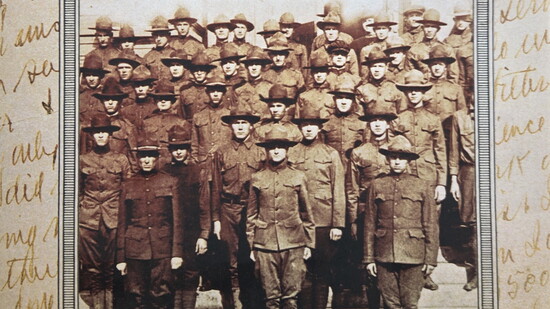In early 1918, as the Great War appeared at long last to be drawing to a close, the University of Oklahoma’s third president, Stratton Duluth Brooks, composed a letter. On Nov. 6—just five days before the armistice that formally ended World War I—he sent the letter to every current and former OU student, as well as all members of the faculty, serving in the armed forces and for whom the university had a mailing address.
In the letter, the president of the still fledgling university asked these men to write back as often as possible, describing their experiences in their branch of service in detail. His stated purpose: to bind the letters together in volumes and kept in the archives of the university.
Within weeks, letters began trickling in, some typed but most scrawled by hand, hastily composed, and almost indecipherable. Other letters arrived the next year, delayed by other duties and the military’s proclivity to move personnel from place to place.
Some 70 men ultimately wrote to President Brooks and, as each letter arrived, it was placed into a box, filed in alphabetical order and deposited in the personal papers of Stratton Brooks.
For over a century, those letters remained stored away in the Western History Collections’ archives, out of sight and out of mind.
A few years ago, OU professor emeritus David W. Levy stumbled across the letters while searching for something else. After perusing them, he decided many featured content that would be of interest to historians and other history buffs, including those with ties to OU.
Levy selected 53 of those letters to be included (in annotated form) in a book titled Sooner Doughboys Write Home (2025, University of Oklahoma Press). The book, which includes an introduction by Levy and a foreword by OU President Joseph Harroz Jr., includes what Levy calls the most “interesting and revealing” of these letters, many by men who went on to become prominent lawyers and physicians locally and in other communities nationwide.
Written by students and faculty of the university—many of whom returned to complete their degree at OU or to serve with distinction on the OU faculty—these letters offer insights into the life of the everyday soldier in the service of the U.S. Army, Navy, Marines or Air Force. The letters reveal military life inside a submarine, in the trenches, in mobile medical units, military and medical training sites here in the United States and elsewhere.
Those familiar with OU history will recognize many of the letter writers’ names, including Walter Stanley Campbell (1887–1957), who had served on OU’s English faculty since 1915 and served six months in France, becoming a captain in the Field Artillery. Under the name Stanley Vestal, Campbell wrote two dozen books on the American West and American Indians. At OU, he founded the Professional Writing program, which has produced dozens of publishing writers over the years.
In his letter, Vestal wrote: “All of us are animated with but one desire—to finish the war and get home. We are not [now?] fighting on because the war is not over. We came over to settle it, so that we could return to our soft drinks and decent towns and jazz bands and Henry Fords and turkey dinners.”
Another well-known figure whose letters are included in the book is Joshua Bryan Lee (1892–1967), a 1917 OU alumnus who served with the 135th Infantry in France, where he was tasked with providing entertainment and raising morale among the troops. After serving 14 months in the war, he returned to OU to chair the Public Speech Department, a position he held until his successful bid for the U.S. House of Representatives in 1934. He was elected to the Senate in 1937 and was sometimes mentioned as a possible vice-presidential candidate in 1940. He ended his career practicing law in Norman.
Sooner Doughboys offers a moving glimpse into the hearts and souls of men who gave months and years of their time, and sometimes their lives, in support of their country through military service. In his introduction, Levy (often referred to as OU’s historian) also offers invaluable insights into the university in the early years of the 20th century, as well as the state and nation.
I read the book in only one or two sittings, enthralled by the glimpse the letters offer of a very different time in American (and OU) history. Some address boredom (between military campaigns or in non-active-duty assignments), others intense feelings of homesickness. Yet others reveal a quiet courage and sense of duty in the face of death and sickness (1918 was the year of the nation’s historic flu epidemic).
Sooner Doughboys Write Home can be purchased online at https://www.oupress.com/.
